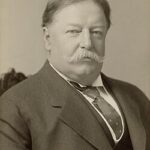The Democratic Reform Movement
The 17th Amendment represented a watershed moment in American democratic evolution. President Taft championed this constitutional reform during the Progressive Era’s height. The amendment transferred senatorial election power from state legislatures to popular vote. 📊 Before 1913, corruption plagued senate selections as special interests influenced state lawmakers. Wealthy industrialists often purchased senate seats through legislative bribery. Taft recognized this system undermined democratic principles and public trust.
Constitutional Implementation Process
The 17th Amendment required extensive congressional and state approval. Taft’s administration worked tirelessly to secure necessary support from reluctant lawmakers. The amendment passed Congress in 1912 and achieved state ratification by 1913. ⚖️ This reform marked the second constitutional amendment during Taft’s presidency. The process demonstrated effective collaboration between federal and state governments. Taft’s legal expertise proved invaluable in navigating complex constitutional procedures.
Elimination of Political Corruption
The 17th Amendment directly addressed widespread corruption in senate elections. State legislatures frequently deadlocked over senatorial appointments for months. 💰 Special interests exploited these delays through financial manipulation and political pressure. Direct election eliminated intermediary corruption and ensured swift selections. Citizens gained immediate control over their federal representation for the first time.
Impact:
Strengthened Democratic Representation
The 17th Amendment fundamentally transformed American democratic participation and accountability. Citizens gained direct power to choose their senators through popular elections. This reform eliminated the corruption that plagued state legislature selections. 🗳️ Voter turnout increased significantly as Americans embraced their expanded electoral rights. The amendment ensured senators answered directly to constituents rather than special interests. This change strengthened the constitutional principle of government by the people.
Enhanced Senate Accountability
Direct election made senators more responsive to public opinion and constituent needs. Previously, senators served state legislative interests rather than popular will. The 17th Amendment created immediate accountability through regular electoral competition. 🔥 Incumbent senators faced direct voter judgment every six years. This pressure encouraged more responsive legislation and constituent services. The amendment reduced corporate influence over senatorial decision-making processes.
Long-term Constitutional Legacy
The 17th Amendment established a precedent for expanding democratic participation in federal elections. This reform influenced subsequent voting rights movements throughout the twentieth century. 🌍 International observers praised America’s commitment to democratic evolution and constitutional flexibility. The amendment demonstrated peaceful political reform through established constitutional processes. Modern senate elections continue operating under this Progressive Era innovation. Taft’s support for the 17th Amendment remains among his most celebrated presidential achievements.
